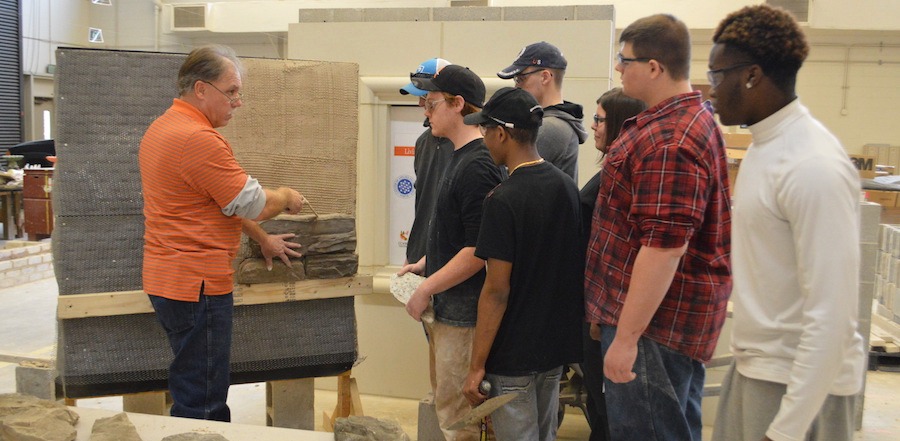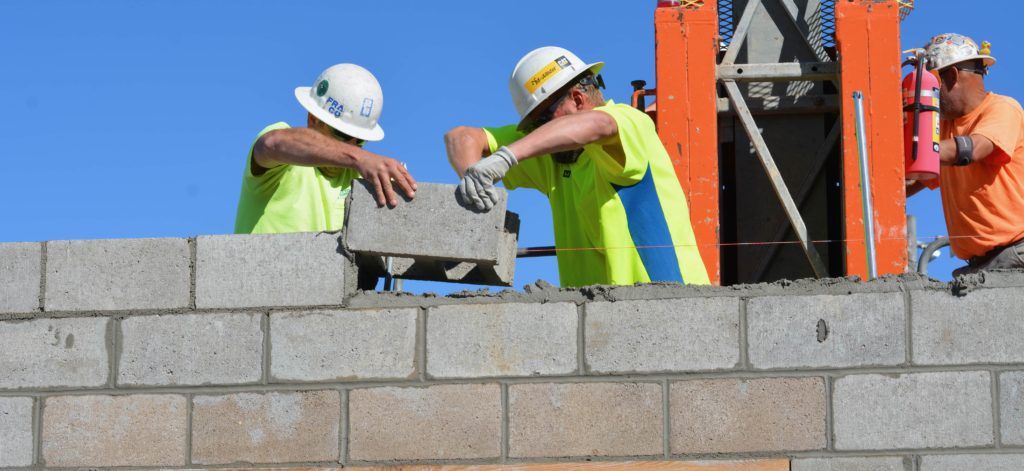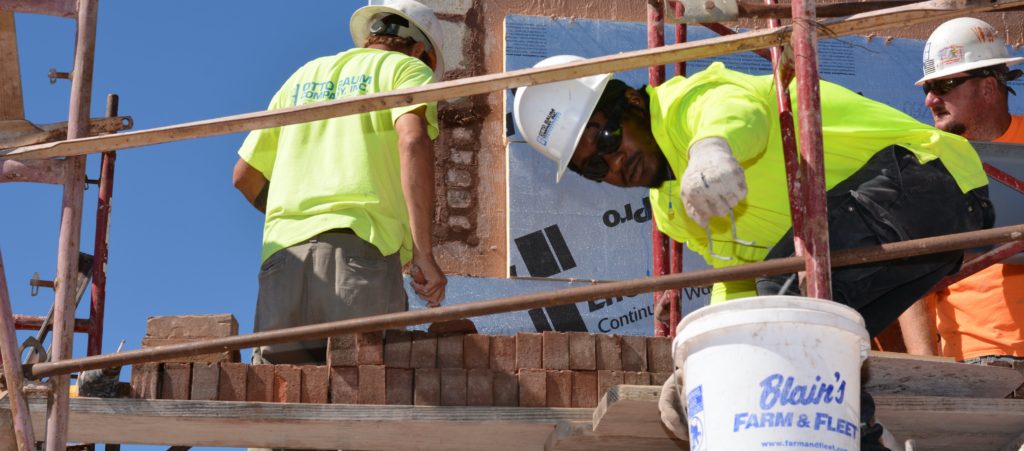Embarking on the Masonry Career Path
Words: MASONRY Magazine
Photos: MASONRY Magazine, Curtis Hoover
The work of a mason is an art made for those who have a passion for craftsmanship and an interest in seeing their work withstand potential adversities throughout the future. An individual interested in a masonry career can successfully master the craft and avoid the hazards through educational resources such as training and apprenticeship opportunities. The workforce is made up of highly-trained professional masons and with the MCAA's resources and networking, the next generation will continue to progress this incredible trade. Becoming a mason takes hard work and dedication. Here are some of the tips and tricks to achieving your goals in the industry.
Training
The first step in pursuing a career in masonry is to take advantage of a local training program. According to Ryan Shaver, Workforce Development and Training Coordinator with the NCMCA, considering your future is pivotal. Ryan Shaver emphasizes this by suggesting that you must "give some thought to if you like working with your hands and not being in front of a computer screen all day. Consider if you like the idea of seeing something you built at the end of the day"
Although it is not the only way to become a mason, Shaver suggests a hands-on approach through a masonry apprenticeship. Taking part in an apprenticeship gives you the opportunity to build something each day, allowing you to get the experience of working hands-on. Learning something new each day and immediately being able to apply that knowledge creates an abundance of experience and an income. “It is a learn-while-you-earn process,” said Shaver. As your skills increase and improve during this process, Shaver indicates that the wage will follow.

In another instance, some students may want to learn more prior to working in the field. “It is very enticing for a young person to start with the pre-apprentice program,” said Shaver. In many cases, the hours spent in the pre-apprentice program have the potential to convert into apprenticeship hours. In North Carolina, Ryan states that “the pre-apprentice hours can convert into your apprenticeship hours.” This means that if a student is in high school or working over the summer in North Carolina, the individual gains credit for the school and the hours towards an apprenticeship.
“The apprenticeship model contains depth instead of just telling people to show up on the job and do the best they can,” said Ryan. “We have a model and a system to increase that student’s skill set and wage as they progress in the apprenticeship.”
The North Carolina Masonry Contractors Association (NCMCA) provides more information on participating in pre-apprenticeships here. The best way to get involved is to talk to a company that is active in their local apprenticeship program for best results, mentorship, and new connections. “Getting involved with a company that is enrolled in the program ensures you are following the correct model,” suggests Ryan.
Before enrolling in a pre-apprentice program, it is important to note the prerequisites. These include being at least 16 years old and have taken the NCCER- Core and Sustainable Construction and Masonry One courses. Some of the benefits from the NCMCA's pre-apprenticeship program include on-the job training, guaranteed $12/hr, and more.
Job Placement
Many masonry resources are readily available and can help guide the career seeker to success. According to the NCCER, various resources and networking capabilities can catalyze career placement. The NCCER has many resources that can aid in career placement such as their career center and education representatives.
While knowledge of the masonry craft can carry an individual well into the career, a higher level of understanding and skills retained assist in career advancements and placements. Like all trades, management becomes a responsibility, whether it be responsibilities of your own, running large-scale projects, or managing your team on-site. For example, one can start assisting in the field by mixing mortar, graduate to laying bricks and blocks, and eventually channel that experience and knowledge into becoming a lead hand or foreman on the jobs.

Obtaining this type of growth throughout your career can be difficult, but resources and industry networking can guide you in the right direction. The NCCER recommends finding a mentor. Seasoned construction professionals can provide a level of guidance that can't be replicated through classes and research. Mentors are an extremely important part in the masonry career as this person can be your support, your teacher, and your connections for potential future workforce labor.
The NCCER recognizes that career development in any field can bring various stressors. Starting a new career and learning a new craft, especially one as independent as the masonry field, can invoke an intense bundle of stress that should be managed effectively. The organization recommends adapting to a healthy balance between work and life. The balance of work life and fun is important in any career, especially in manual labor and in a niche skilled profession.
If you choose to have a mentor and are feeling some stress, it is important to feel comfortable to lean on them with honesty and open ears. Many mentors have weekly conversations that are implemented in order to create a supportive and open relationship, allowing the student to feel comfortable and driven in the industry. Another great way to avoid the stress of unknown skills, as previously mentioned, is participating in masonry pre-apprentice programs. These can eliminate the doubt or stress of initially getting involved.
Before joining the career force, you must be open to interviewing and networking in a professional fashion. One of the key components to get your resume to stand out is by having a proactive and brief cover letter. Using your cover letter and resume to highlight strengths, credentials, and experience can be an easy way to get your foot in the door of the masonry industry.

The NCCER provides various resources for career placement opportunities, certifications, and more. Job placement is essential and can be an easier process with the help of teachers, mentors, and associations such as the MCAA. Some of the NCCER training program resources include journeymen training and certifications along with other resources to assist in your career advancement. The MCAA has many resources for those seeking to get their masonry certification or develop their skills further in technical knowledge and skill.
Avoiding Common Mistakes
When entering a career, it is common for bad habits to be developed. According to the NCCER, detrimental and inefficient habits can cause severe issues for the young mason who finds promotion in a management role. The masonry industry, along with many others, requires dedication and determination.
Setting out on a masonry career path can be overwhelming, with persistent hours and demands. While time must be conserved and funds used responsibly, young masons-to-be should rationalize the need for equipment, such as personal protective equipment. While it might be attractive to forego its use, the resulting hazard can potentially end a career in the infancy stage. With that being said, entry level masons can use simple PPE as many experienced laborers prefer their higher-grade comfort.
A new tool might be expensive; however, its use could eliminate hours of labor. This would end up rearing savings for the masonry contractor, so if it is affordable, its purchase could allow for an increased earning. On the other hand, if the new tool purchase devours the buyer’s entire savings or operating capital, it would probably be better. It is better to identify the need, consider its costs, and develop a game plan that compliments the budget.

As is life, masonry is rooted in continuing education. As new products and procedures are introduced into the trade, masons should recognize their value and continually seek further information, improved ideas, and continuing education courses. A mistake of enormous consequence is failure to admit you do not know the answer to a crucial question.
One should never rule out the power in mentorship and peers. Lean on the experience and knowledge of your trade because everyone started somewhere. Helping each other and having an experienced leader allows for more learning and a better understanding of masonry. Asking questions and being open to criticism is key in developing in any career, but with masonry as a focus. The masonry community is an ever-changing and supportive family with friendly instructors and mentors looking to develop the future of our workforce.